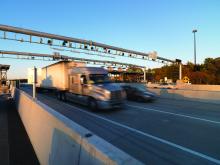A new report issued by the International Bridge, Tunnel and Turnpike Association (IBTTA) in advance of the busy Fourth of July holiday travel season indicates that as Americans take to the roads this summer they will more often choose toll roads to get them to their destinations than in years past.
The report, 2015 Report on Tolling in the US, reveals that the number of trips drivers have taken on tolls roads has increased 14 per cent over the last four years, rising from 5 billion trips in 2011 to 5.7 b
A new report issued by the 3804 International Bridge, Tunnel and Turnpike Association (IBTTA) in advance of the busy Fourth of July holiday travel season indicates that as Americans take to the roads this summer they will more often choose toll roads to get them to their destinations than in years past.
The report, 2015 Report on Tolling in the US, reveals that the number of trips drivers have taken on tolls roads has increased 14 per cent over the last four years, rising from 5 billion trips in 2011 to 5.7 billion in 2015. Additionally, the831 Federal Highway Administration shows a 9 per cent increase in the miles of toll roads in the US from 5,431 miles in 2011 to over 5,932 miles as of 2013.
The report also shows that Americans continue to embrace new technologies being developed by the tolling industry, including all-electronic tolling (AET). With AET there is no waiting in long lines, idling in traffic or throwing money in a basket.
In fact, the findings show there are 37 million electronic toll accounts across the US. This is an increase of 20 per cent in the past five years. For nearly every account, there are multiple drivers, doubling the number of drivers using all-electronic tolling regularly.
“Our report shows drivers and policymakers alike are continuing to see the benefits of toll roads now located in 34 states throughout the country,” said Patrick D. Jones, executive director and CEO of IBTTA. “Throughout this summer’s driving season, more reliable trip times and overall improved mobility provided by well-maintained and well-designed toll roads are providing drivers the premium benefits they seek.”
The report also reveals that the fatality rate on toll roads is about one-third the rate of all US roads, or 1.47 per 100 million vehicle miles travelled.
One major reason for the improved safety on toll roads is because they are typically operated centrally on a 24-hour basis from modern operations centres linked to dedicated maintenance, emergency response and police personnel. In fact, more than $14 billion in capital investment was made over three years by the top 40 US toll facilities.
The report, 2015 Report on Tolling in the US, reveals that the number of trips drivers have taken on tolls roads has increased 14 per cent over the last four years, rising from 5 billion trips in 2011 to 5.7 billion in 2015. Additionally, the
The report also shows that Americans continue to embrace new technologies being developed by the tolling industry, including all-electronic tolling (AET). With AET there is no waiting in long lines, idling in traffic or throwing money in a basket.
In fact, the findings show there are 37 million electronic toll accounts across the US. This is an increase of 20 per cent in the past five years. For nearly every account, there are multiple drivers, doubling the number of drivers using all-electronic tolling regularly.
“Our report shows drivers and policymakers alike are continuing to see the benefits of toll roads now located in 34 states throughout the country,” said Patrick D. Jones, executive director and CEO of IBTTA. “Throughout this summer’s driving season, more reliable trip times and overall improved mobility provided by well-maintained and well-designed toll roads are providing drivers the premium benefits they seek.”
The report also reveals that the fatality rate on toll roads is about one-third the rate of all US roads, or 1.47 per 100 million vehicle miles travelled.
One major reason for the improved safety on toll roads is because they are typically operated centrally on a 24-hour basis from modern operations centres linked to dedicated maintenance, emergency response and police personnel. In fact, more than $14 billion in capital investment was made over three years by the top 40 US toll facilities.







